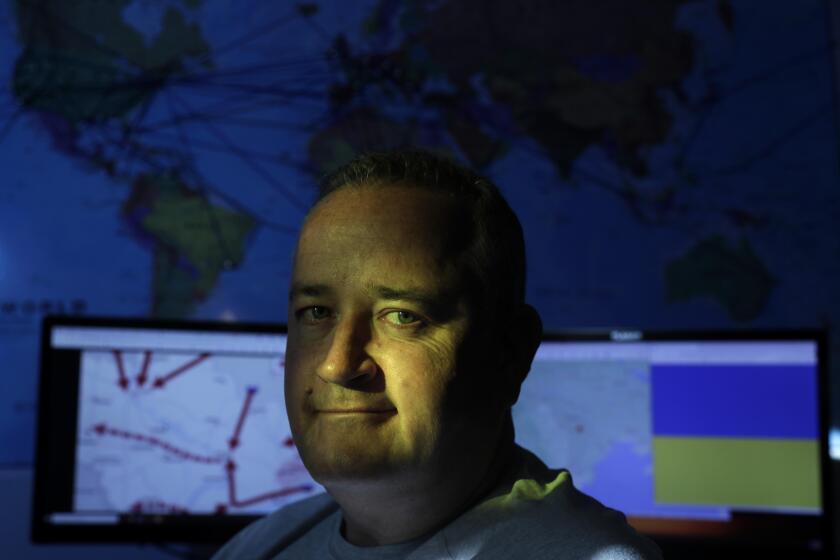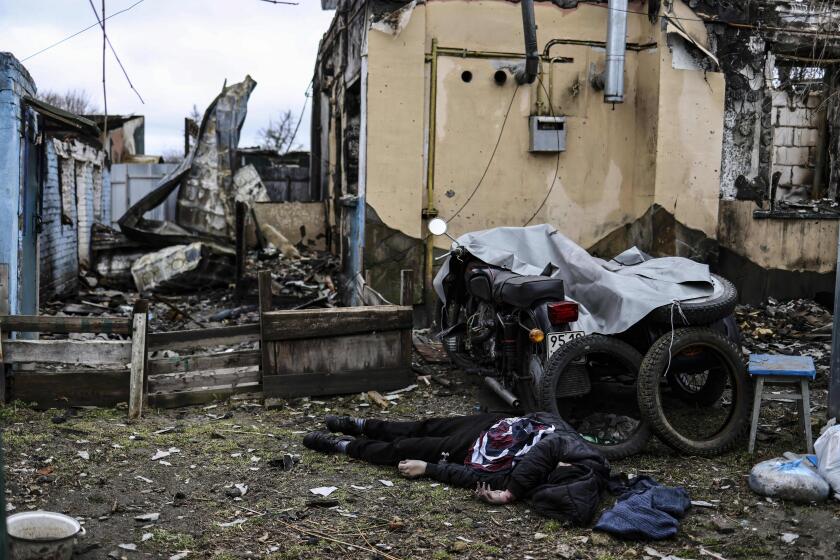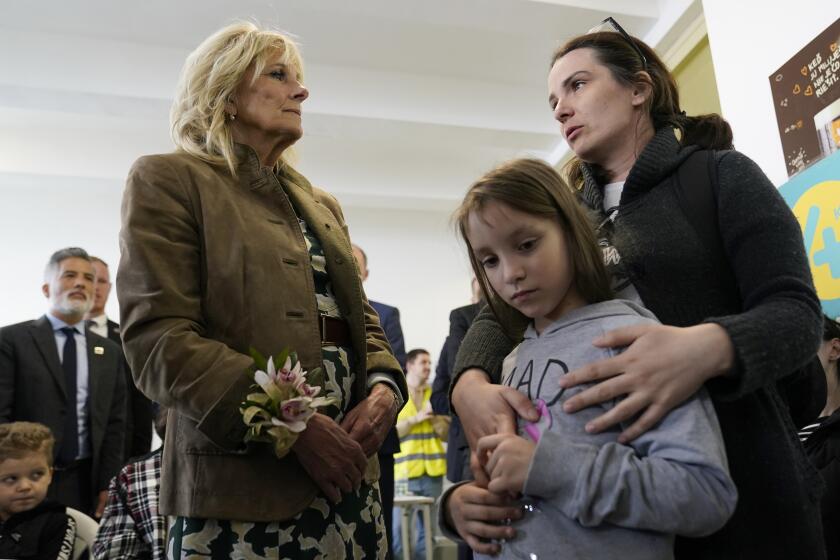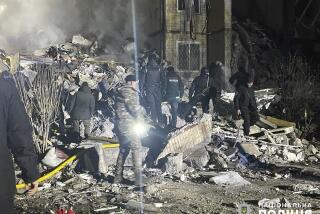Odesa pounded by multiple missiles as Russia hits Ukraine’s ports
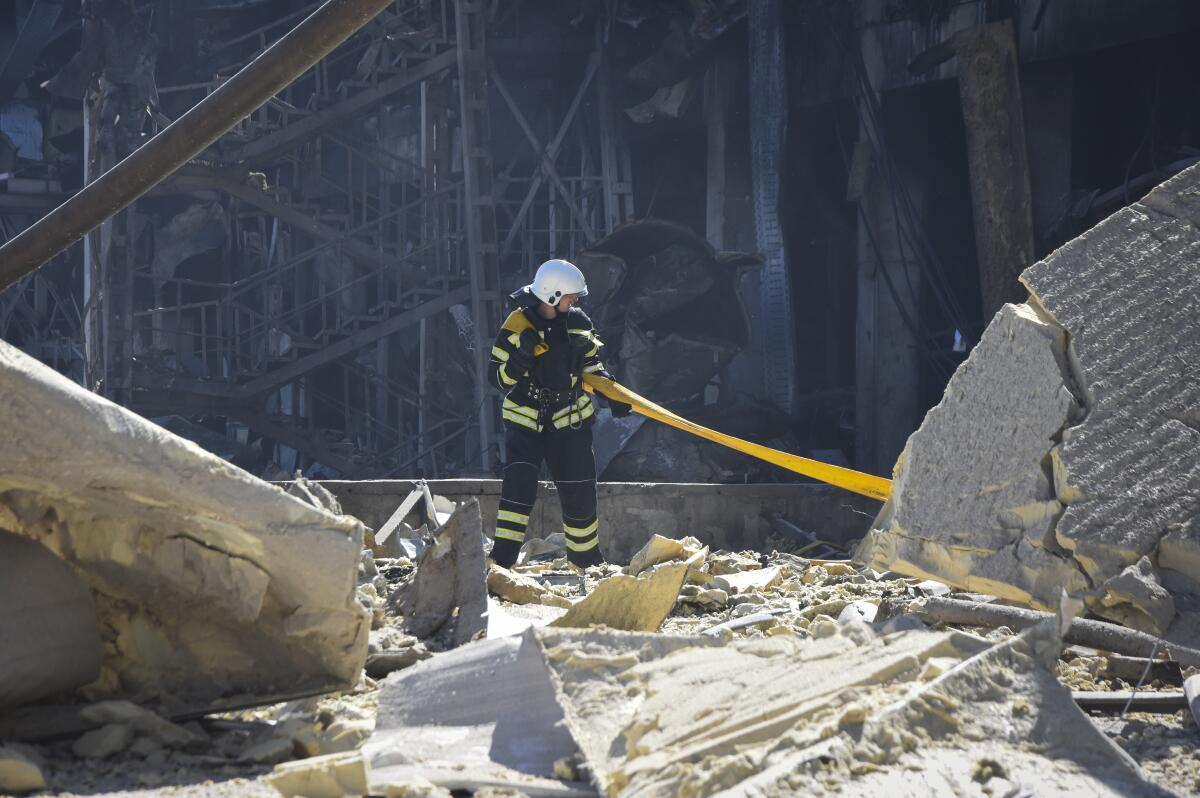
LVIV, Ukraine — Moscow’s ambitions to overtake southern Ukraine appeared to grow Tuesday with reports that Russia had fired hypersonic missiles on the Black Sea city of Odesa, and the Ukrainian leadership warned of a global food crisis if Russia does not lift a naval blockade that has decreased grain shipments leaving the nation’s ports.
Ukraine said firefighters were battling blazes in Odesa after seven missiles struck targets, including a shopping center and a warehouse, killing at least one person and injuring five. Video posted on Facebook by the Ukrainian army showed rescue groups surrounded by smoking rubble.
Serhiy Bratchuk, a spokesman for the Odesa regional military, said in an update that a separate strike by three Kinzhal hypersonic missiles had also hit “tourism” locations in Odesa.
The Kinzhal is more destructive than conventional missiles because its speed — several times that of sound — enables it to better evade antimissile systems. Its use on Odesa could not be verified, though Russia first claimed to unleash the new weapons in March on targets in western Ukraine.
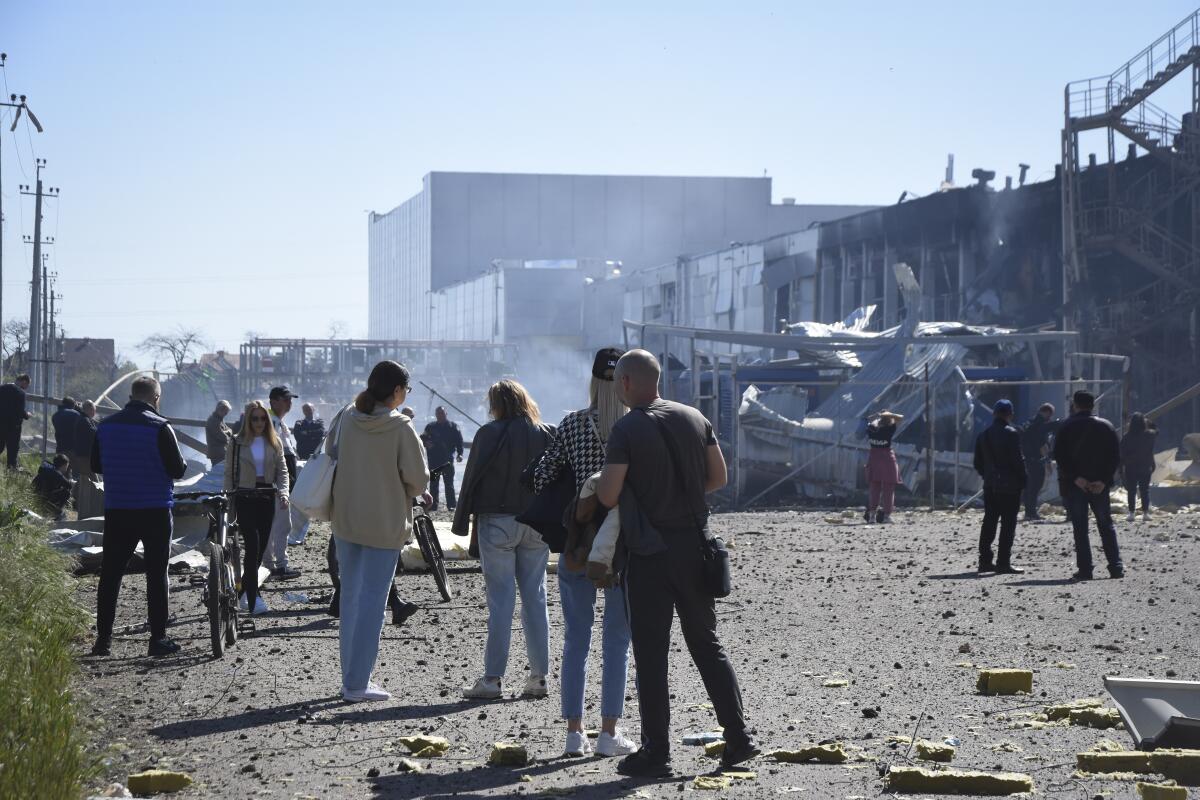
Pentagon analysts have noticed an uptick in Russian manpower and sorties by fighter jets deployed in Ukraine since Monday.
A senior Defense official said Tuesday that an estimated 2,000 additional Russian troops were moved into the battlefield, probably by air. He could not say what part of the country they were deployed to but noted most Russian offensive attacks remain concentrated in the Donbas region and the ports of Mariupol and Odesa.
Air sorties, which have averaged 200 to 300 per day, totaled more than 300 in the last 24 hours, the official said.
Pentagon spokesman John F. Kirby told reporters that he could not cite “any evidence” that Russia used hypersonic missiles in its attack on Odesa, as Ukrainian officials have claimed. But he noted that Moscow has already fired such weapons in this war and that Russian forces are running through their precision-guided missiles “at a pretty fast clip.”
Also Tuesday, U.S. officials sounded the alarm over their ability to continue supplying weapons to Ukraine. Secretary of State Antony J. Blinken and Secretary of Defense Lloyd J. Austin III wrote Congress this week to urge lawmakers to approve up to $40 billion in weapons and other aid for Ukraine before the current $13.5-billion package is depleted. Tuesday evening, the House did just that, emphatically approving the $40 billion, in a bipartisan commitment to thwart Russian President Vladimir Putin’s nearly 11-week-old war.
State Department spokesman Ned Price said Tuesday that the final $100 million in that package runs out next week.
Ukrainian President Volodymyr Zelensky, meanwhile, called on world powers to break a Russian blockade of his nation’s ports.
Citing the key role that Odesa, in the southwest near Moldova, plays in the global agricultural trade, Zelensky said in a video address that shortages of grain exports were bound to get worse if attacks continued and Western powers did not put an end to the Russian blockade of Ukrainian ports. Nations around the world depend heavily on grain from the fertile Black Sea region, which some call the “breadbasket of Europe.”
“For the first time in decades, there is no usual movement of the merchant fleet, no usual port functioning in Odesa,” Zelensky said. “Probably this has never happened in Odesa since World War II.
“Without our agricultural exports, dozens of countries in different parts of the world are already on the brink of food shortages. And over time, the situation can become downright terrible.”
A Los Angeles-based aid group says not all volunteers, even those with pertinent skills, would be a good fit for operations near a warzone. Still, one Angeleno has flown to Eastern Europe.
Ukraine is “sitting on 8 billion euros’ worth [about $8.4 billion] of wheat” that cannot be exported amid the war and Russia’s blockade of Black Sea ports, the president of the European Investment Bank, Werner Hoyer, said Tuesday.
“They are sowing like crazy right now, and they will expect probably a good harvest, maybe 70% of last year’s harvest, in a couple of months,” Hoyer said. “And then what to do with it?”
In a report released this month, the European Bank for Reconstruction and Development predicted a greater economic slowdown and more inflationary pressure in its regions as a result of the war. The bank’s research suggests that Ukraine’s economy will shrink 30% this year.
On the other side of Ukraine, in the southeast, officials said Tuesday that Russian attacks continued to hit the port city of Mariupol, where dramatic scenes have unfolded in the last week of civilians rescued from a vast steelworks where they and a group of fighters were sheltering.
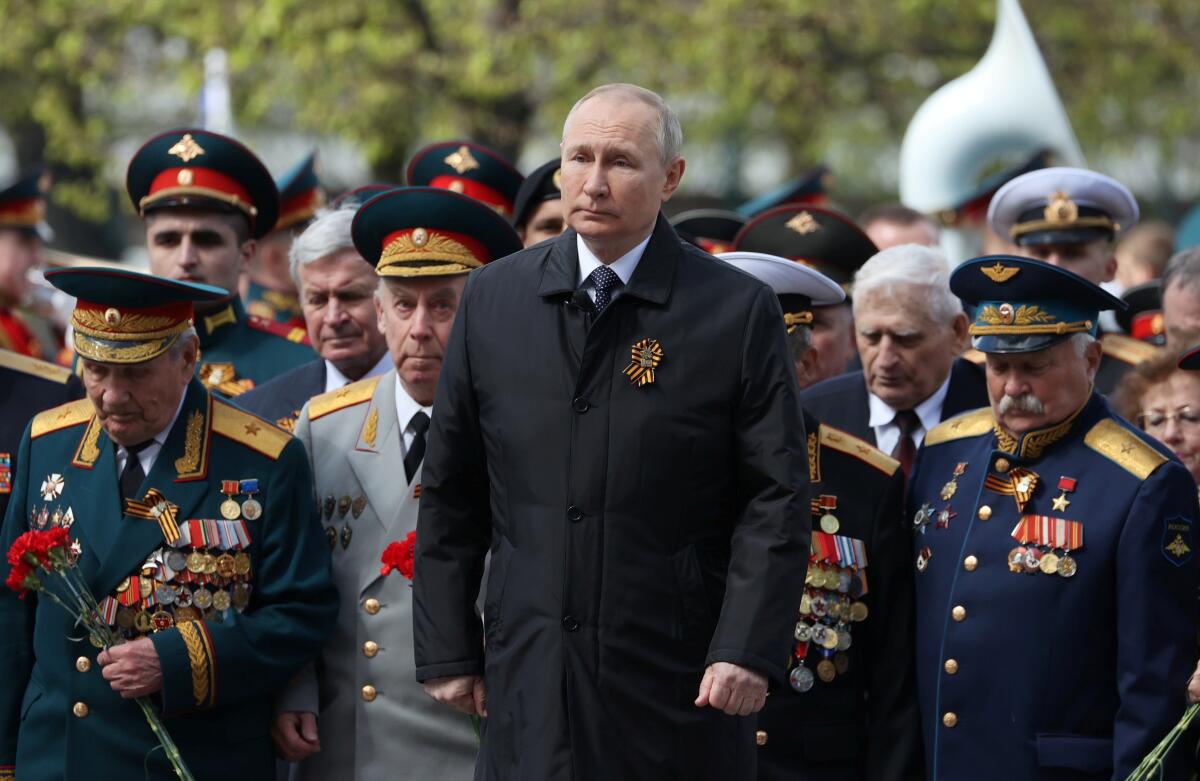
Petro Andryushchenko, an advisor to the mayor, said on Telegram that he believed 100 people remained in the Azovstal steel complex’s underground tunnels. Andryushchenko said that the area was still under fire Tuesday.
The situation in the plant has been hard to ascertain even for Ukrainian authorities, who in earlier days said they believed all or most civilians had been evacuated.
Mariupol, under near-total Russian control, was the site Monday of a Russian military observation of Victory Day, a Russian holiday marking the Soviet triumph over Nazis during World War II.
Weeks after Russian occupation, rural areas outside Ukraine’s capital still yield forest graves. Exhumations remain a near-daily task for police.
Some analysts had predicted that Putin, who presided over a highly orchestrated celebration in Moscow complete with military marches and music, would use the occasion to declare all-out war on Ukraine. Instead, he lashed out against the North Atlantic Treaty Organization and the U.S., saying Russia was responding to “aggression” by Western powers.
In Mariupol, Andryushchenko said that while Russian troops held celebratory exercises in the city, “no excitement or joy on the street was particularly noticeable. ... Something went wrong with the holiday because Mariupol is Ukraine, not Moscow.”
With Moscow having declared victory over Mariupol — which would give it one piece of a desired land corridor linking Russia, Crimea and western Ukraine — and military gains somewhat stalled along the eastern Donbas battlefront, American and British military analysts say attacks on Odesa and the west could increase as a way to lure Ukrainian firepower from the east.
In the nation’s northeast around Kharkiv, which has been under near-daily assault since the beginning of the war but remains in Ukrainian control, a local leader said Tuesday that bodies were still being recovered from attacks in March.
The Ukrainian military was gradually pushing Russian troops away from Kharkiv, Zelensky said in his nightly address.
As many as 60 people are feared dead at a school in Ukraine. Zelensky compares the fight against Russia to World War II battle against Nazi Germany.
Regional administrator Oleh Sinegubov said in a Telegram post that dozens of bodies were found in Izyum in the rubble of a residential building that collapsed under missile fire in March. Izyum is about 75 miles from Kharkiv, which is the second-largest city in Ukraine.
“This is another horrible war crime of the Russian occupiers against the civilian population,” Sinegubov said.
Air-raid sirens were also reported to have sounded Tuesday in Luhansk and Dnipro.
Luhansk Gov. Serhiy Haidai said on social media that the region was hit with Russian attacks 22 times over the last day.
Start your day right
Sign up for Essential California for the L.A. Times biggest news, features and recommendations in your inbox six days a week.
You may occasionally receive promotional content from the Los Angeles Times.
“The Russians fired en masse on all possible routes out of the region,” Haidai said.
Zelensky, who since March has received various Western leaders eager to show their support for Ukraine, including House Speaker Nancy Pelosi (D-San Francisco), hosted the foreign ministers of Germany and the Netherlands on Tuesday.
German Foreign Minister Annalena Baerbock toured Kyiv and bombed-out suburbs, including Irpin, with Dutch Foreign Minister Wopke Hoekstra.
The visit by Baerbock, the first German government official to travel to Ukraine since the war began Feb. 24, could mark a shift in a tense relationship that has seen Kyiv accuse Berlin of being too slow to send military aid and to formulate a ban on Russian energy imports. Germany is among the European Union nations with the strongest trade relationships with Russia.
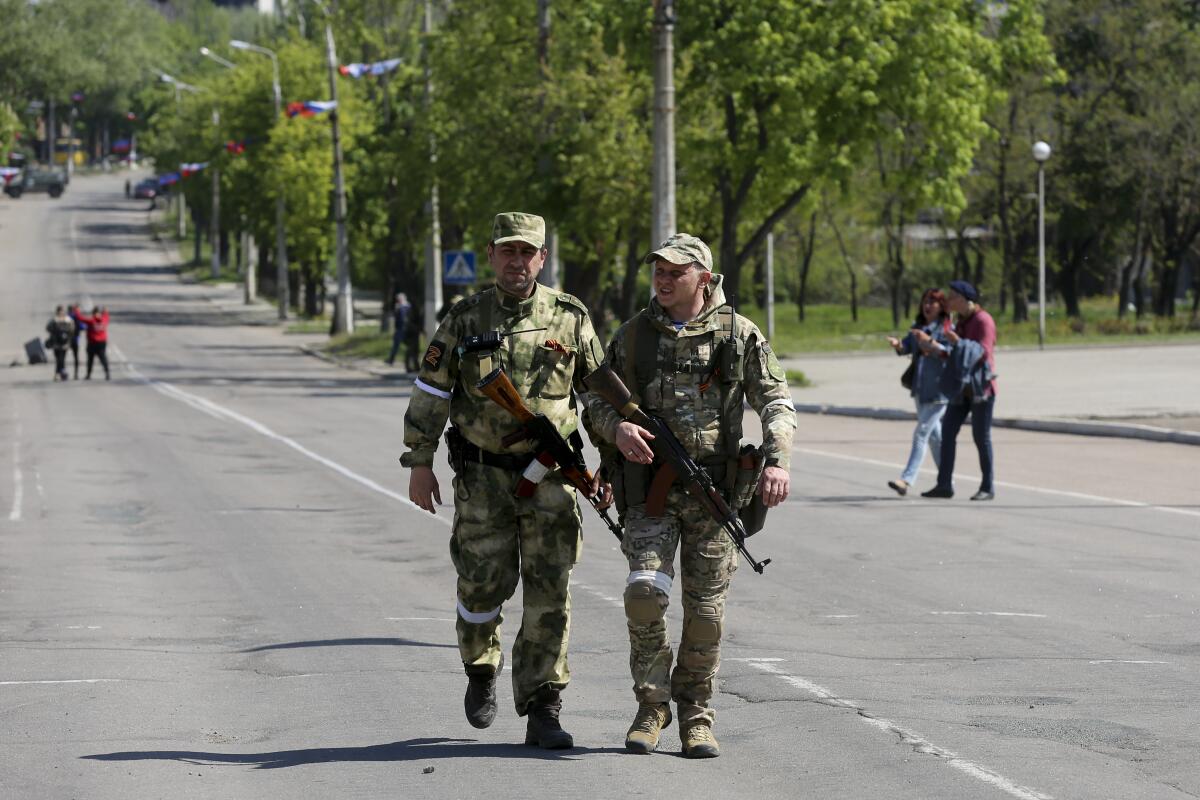
In April, Kyiv said German President Frank-Walter Steinmeier was not welcome to visit. Last week, Zelensky relented and invited Steinmeier and German Chancellor Olaf Scholz to the capital.
Speaking in Bucha, the suburb where the discovery of mass graves last month brought international condemnation of Russia, Baerbock said Germany was committed to supporting Ukraine.
“We owe it to the victims that we don’t just commemorate them here but that we hold the perpetrators to account,” she said.
Zelensky also spoke via video Tuesday to the Slovakian parliament. He repeated a warning he has given other nations that Russia’s ambitions do not stop at Ukraine’s borders.
A video of Oksana Balandina, who lost both legs to a land mine, and Viktor Vasyliv dancing at their hospital wedding has lifted spirits in Ukraine.
“If we fail to stop the Russian troops, they will come everywhere they can, including to the territory of Slovakia,” Zelensky said.
The United Nations has confirmed at least 3,381 civilian deaths during the war. Speaking Tuesday at a news conference in Geneva, the head of the U.N. Human Rights Mission in Ukraine said the real number is substantially higher.
The war has caused nearly 6 million Ukrainians to flee for other nations, according to the U.N. Eight million have been displaced internally.
After meeting with Ukrainian refugees in Moldova on Tuesday, U.N. Secretary-General Antonio Guterres told reporters that “it is impossible to meet refugees and not be deeply moved by their stories.”
“This tragedy demonstrates that war is a senseless thing, and that this war must stop,” he said.
King reported from Lviv, Kaleem from London and Parvini from Los Angeles. Times staff writer Tracy Wilkinson in Washington contributed to this report.
More to Read
Sign up for Essential California
The most important California stories and recommendations in your inbox every morning.
You may occasionally receive promotional content from the Los Angeles Times.
